[Dear Friends, Colleagues, Contributors and Collaborators:
This page, like this website as a whole, is still in an early stage of development. Now, already in 2016, and as the days evaporate away I must, with a very heavy heart, admit that this whole project should be much further along than it is. I am not months, but years behind schedule. Please consider what you see here to be little more than the roughest outline and sketch of what should be set down regarding the state of progress in the re-unification of the Orthodox-Catholic Church and the re-establishment of something that might in fairness be called a Christian civilization. Please visit again.
DOC
]
|
| |
And his gifts were that some should be apostles, some prophets, some evangelists, some pastors and teachers, to equip the saints for the work of ministry, for building up the body of Christ, until we all attain to the unity of the faith and of the knowledge of the Son of God, to mature manhood, to the measure of the stature of the fulness of Christ; so that we may no longer be children, tossed to and fro and carried about with every wind of doctrine, by the cunning of men, by their craftiness in deceitful wiles. |
| |
|
Saint Paul to the Ephesians 4:11-14 [emphasis added] |
| |
|
|
| |
The One and The Three |
|
| |
... or at all events The One plus three others, each of necessity members of The Twelve ... |
|
| |
|
|
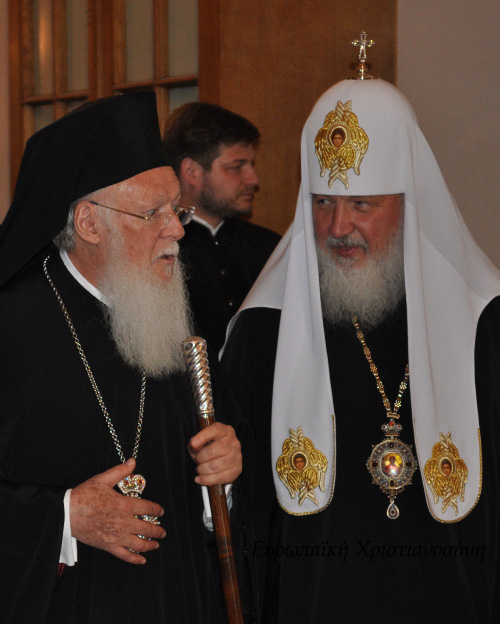 |
|
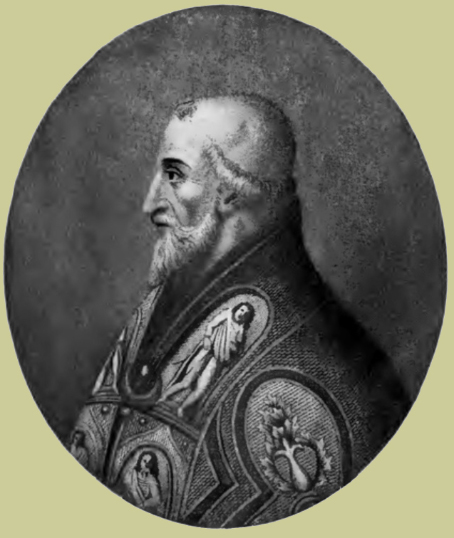
|
|
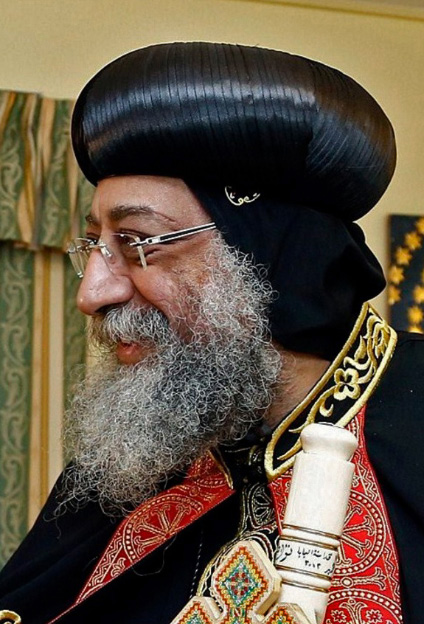 |
Our Holy Fathers, Patriarchs of Constantinople-Moscow
|
|
Rome – The Supreme Pontiff
The Successor to Peter,
the Prince of the Apostles,
The Pope |
|
Alexandria
|
Bartholomew-Βαρθολομαίος and Kirill-Кирилл
|
|
Pope Saint Leo IX
is pictured
(* 21 June 1002; reigned from 12 February 1049 to 19 April 1054†)
|
|
 |
 |
| Πάπας Θεόδωρος Β΄ |
| Pope Tawadros II |
| Pope Theodore II |
118th Pope of Alexandria
& Patriarch of All Africa on the Holy Apostolic See of Saint Mark the Evangelist of the Coptic Orthodox Church of Alexandria |
|
| |
|
Picture of Patriarchs Bartholomew and Kirill together on 29 May 2010 in the
Свято-Троицкая Александро-Невская Лавра в Санкт-Петербурге –
Holy Trinity Alexander Nevsky Lavra in Saint Petersburg is ours, all rights reserved. |
| |
|
Photos of Pope Leo and of Pope Tawadros from Wikicommons; may be freely used. |
| |
But there is no authority from Scripture or from early Church Fathers in support of the Primacy of Honor line. Any Orthodox priest or bishop or patriarch who rests on this alone immediately signals his lack of integrity or intellect or both, and therewith his unfitness for the high office to which he was called. For the rest, there is serious and difficult work of extreme importance that we need to be about. |
|
| |
|
|
| |
|
On the morrow Moses sat to judge the people, and the people stood about Moses from morning till evening.
When Moses' father-in-law saw all that he was doing for the people, he said, "What is this that you are doing for the people? Why do you sit alone, and all the people stand about you from morning till evening?"
And Moses said to his father-in-law, "Because the people come to me to inquire of God; when they have a dispute, they come to me and I decide between a man and his neighbor, and I make them know the statutes of God and his decisions."
Moses' father-in-law said to him, "What you are doing is not good. You and the people with you will wear yourselves out, for the thing is too heavy for you; you are not able to perform it alone. Listen now to my voice; I will give you counsel, and God be with you! You shall represent the people before God, and bring their cases to God; and you shall teach them the statutes and the decisions, and make them know the way in which they must walk and what they must do. Moreover choose able men from all the people, such as fear God, men who are trustworthy and who hate a bribe; and place such men over the people as rulers of thousands, of hundreds, of fifties, and of tens. And let them judge the people at all times; every great matter they shall bring to you, but any small matter they shall decide themselves; so it will be easier for you, and they will bear the burden with you. If you do this, and God so commands you, then you will be able to endure, and all this people also will go to their place in peace."
So Moses gave heed to the voice of his father-in-law and did all that he had said. Moses chose able men out of all Israel, and made them heads over the people, rulers of thousands, of hundreds, of fifties, and of tens. And they judged the people at all times; hard cases they brought to Moses, but any small matter they decided themselves. Then Moses let his father-in-law depart, and he went his way to his own country. |
| |
|
|
Exodus 18:13-27 (emphasis added) |
|
| |
|
|
|
... but take care ... |
| |
|
Then said Jesus to the crowds and to his disciples, The scribes and the Pharisees sit on Moses' seat; so practice and observe whatever they tell you, but not what they do; for they preach, but do not practice. |
| |
|
|
Matthew 23:1-3 |
|
| |
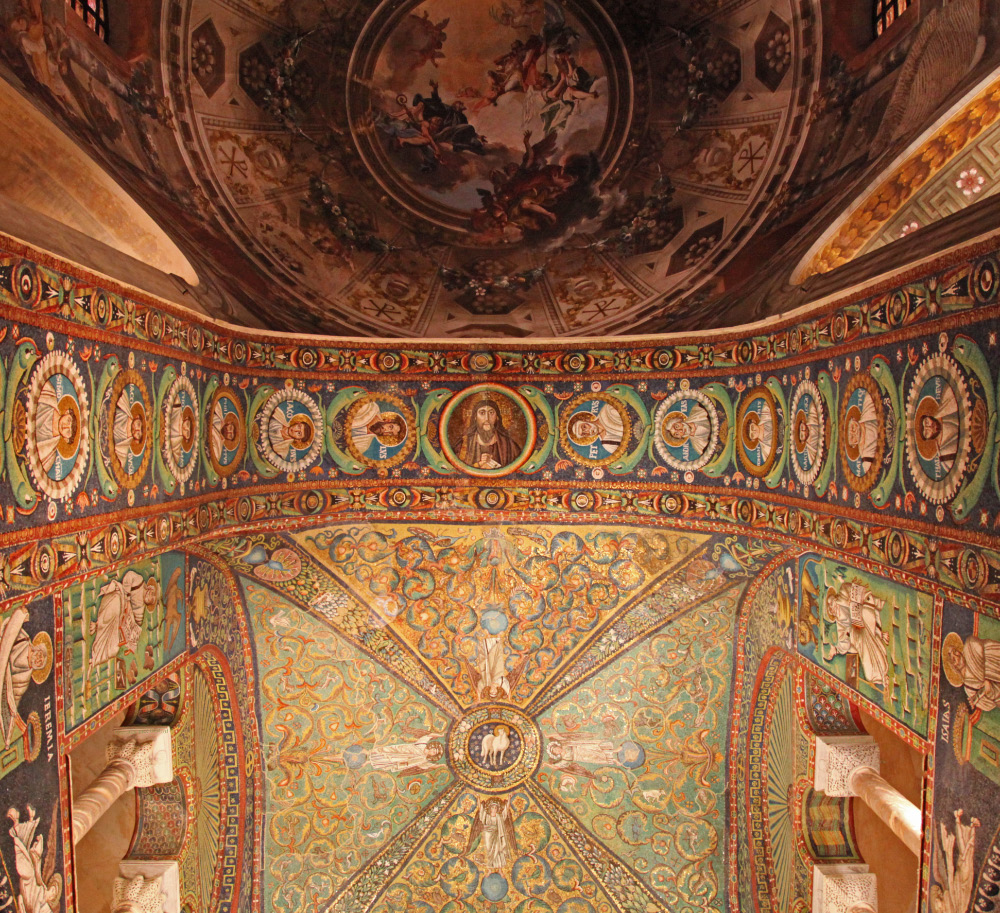 |
|
| |
Basilica of San Vitale in Ravenna, consecrated 547 AD, in honor of Saint Vitalis of Milan, 1st/2nd century saint and martyr. Shown here are parts of the great cupola; the intrados of the great triumphal arch depicting Christ Jesus with the Twelve Apostles (including Apostle Saint Paul rather than Apostle Saint Matthias); then the choir ceiling. |
|
| He who hears you hears me, and he who rejects you rejects me, and he who rejects me rejects him who sent me. |
|
|
|
| |
Luke: 10:16 (and John 13:20) |
|
|
|
| |
|
|
There are many threshold issues which, although vital, will be given short shrift here. The topics addressed in this website and in the film, United European Christendom - Heal the Schism Now, are vast, and it is not desirable to add endlessly to them within these media. More to the point, this website and the film are addressed first and foremost to believing Orthodox-Catholic Christians: those people who embrace the Gospel of Salvation through repentance, baptism and belief in Jesus Christ and who have entered into the life of one of the (presently not fully united) Oriental Orthodox, Orthodox or Catholic Churches. It is the goal of this website and film that they be fully united. To those who believe that God did not intend to establish a Church, or that He intended to establish a Church but failed or that the "church" is just the sum total, some loose association, of believers in Jesus Christ and the Bible, however those are understood, and who need not even share common belief in the content of the faith, to such people questions pertaining to Authority within the Church and Primacy of Authority at the Universal Level are either meaningless or hopelessly muddled. Here one encounters what is a Protestant problem, a problem of the disciples of Luther and Calvin and Cranmer and their countless breakaway offshoots, and also of those groups (almost exclusively of 19th Century American origin) which, though they may self-identify as being Christians, are not held to be Christians even by the Lutherans, Calvinists or Anglican-Cranmerists. And then of course the past two centuries and more have seen the emergence of the ever-morphing, pan-heresy, "synthesis of all heresies" which later took on the label, Modernism. |
| |
|
|
| |
|
|
|
|
| |
For those who understant that there actually is a God-ordained and instituted Church, that is, for those who are already, and for those nearing the decision that they wish to become, Orthodox-Catholic Christians, authority and primacy of authority correspond to Christ's own three-fold ministry of prophet, priest and king:
teaching the one and only true faith, free from error
sanctifying through the administration of the Holy Sacraments
governing the entire community of the faithful, ordained bishops, priests, deacons and laity in unity of faith.
within the visible, pilgrim Orthodox-Catholic Church on Earth, the one, holy, catholic and apostolic Church of the Niceno-Constantinopolitan Creed set down in 325 and 381.
Those who hold that unity of theological doctrine does not matter — that doctrine does not matter, that the content of the faith does not matter — however well meaning they may imagine themselves or are imaged by others to be (usually such persons are not all that well-meaning) are not Christians.
Those who understand the truth that doctrine does matter but who have found themselves lead astray by teachers of false doctrine have also thereby found themselves distanced from the source of truth, from God. Better correct. |
|
| It has been the job of the Apostles and their successors to keep the teaching of the Church free from the doctinal error that God foretold would challenge the Church. |
| |
|
| |
To Titus, my true child in a common faith: Grace and peace from God the Father and Christ Jesus our Savior. This is why I left you in Crete, that you might amend what was defective, and appoint elders in every town as I directed you, if any man is blameless, the husband of one wife, and his children are believers and not open to the charge of being profligate or insubordinate. For a bishop, as God's steward, must be blameless; he must not be arrogant or quick-tempered or a drunkard or violent or greedy for gain, but hospitable, a lover of goodness, master of himself, upright, holy, and self-controlled; he must hold firm to the sure word as taught, so that he may be able to give instruction in sound doctrine and also to confute those who contradict it. For there are many insubordinate men, empty talkers and deceivers, especially the circumcision party; they must be silenced, since they are upsetting whole families by teaching for base gain what they have no right to teach. |
| |
|
Titus 1:4-11
|
| |
I appeal to you, brethren, to take note of those who create dissensions and difficulties, in opposition to the doctrine which you have been taught; avoid them. For such persons do not serve our Lord Christ, but their own appetites, and by fair and flattering words they deceive the hearts of the simple-minded. For while your obedience is known to all, so that I rejoice over you, I would have you wise as to what is good and guileless as to what is evil; then the God of peace will soon crush Satan under your feet. The grace of our Lord Jesus Christ be with you. ... Now to him who is able to strengthen you according to my gospel and the preaching of Jesus Christ, according to the revelation of the mystery which was kept secret for long ages but is now disclosed and through the prophetic writings is made known to all nations, according to the command of the eternal God, to bring about the obedience of faith -- to the only wise God be glory for evermore through Jesus Christ! Amen. |
| |
|
Romans 16:17-20; 25-27
|
| |
|
Abide in me, and I in you. As the branch cannot bear fruit by itself, unless it abides in the vine, neither can you, unless you abide in me. I am the vine, you are the branches. He who abides in me, and I in him, he it is that bears much fruit, for apart from me you can do nothing. |
| |
|
|
John 15:4-5 |
| |
Authority over What and within What?
The Church — the Body of Christ, the Icon of the Holy Trinity, the Perpetual Pentecost |
|
| |
|
|
... I will build my church, and the powers of death [the gates of hell] shall not prevail against it... |
| |
|
|
|
Matthew 16:18
|
| The three groups, the three ecclesiastic communities within the Orthodox-Catholic Church — let us pray and hope and have faith that it will be so — the Catholic Church and the Orthodox Churches and the Oriental Orthodox Churches each teach doctrine which is near to being identical to that taught by the other two groups. Such doctrine must become fully identical through the same processes whereby the Seven Ecumenical Councils, which were held from 325 to 787 Anno Domini, discerned the truth and routed out error, except for matters which it is decided through that self-same Ecumenical Council to come can be appropriately left to the realm of pious theological opinion – theologumena – to be used by the believer if useful and set aside if not, so long as they do not contradict orthodox teaching. |
|
And Jesus came and said to them, "All authority in heaven and on earth has been given to me. Go therefore and make disciples of all nations, baptizing them in the name of the Father and of the Son and of the Holy Spirit, teaching them to observe all that I have commanded you; and lo, I am with you always, to the close of the age." |
| |
|
|
|
Matthew 28:18-20
|
| |
|
|
.Let God be true though every man be false... |
| |
|
|
|
Romans 3:4 |
| Église |
|
Chiesa |
|
Igreja |
|
Iglesia |
|
Ecclesia |
|
they who are called (or separated) out |
|
Εκκλησία |
|
Kakhal/Qahal/Kahal |
|
קָהָל |
|
קהל |
| Κυριακόν |
|
Kyriakon |
|
Църква |
|
Церковь |
|
Церква |
|
belonging to the Lord |
|
Господу принадлежащее |
|
Church |
|
Kyrkan |
|
Kirche |
|
| |
|
|
| |
And yet the Body of Christ, the Icon of the Holy Trinity, the Perpetual Pentecost, so very clearly can never be divided, can not be in Schism, can have no need of healing. |
|
| |
|
The Orthodox-Catholic Church
— one, holy, catholic and apostolic —
The Church
Outside the Church there is no Salvation – Extra Ecclesiam Nulla Salus – Außerhalb der Kirche gibt es kein Heil
Изван Цркве нема Спасења – În afara Bisericii nu există Mântuire – Izvan Crkve nema Spasenja
Hors de l'Église il n'y a pas de salut – Вне Церкви нет Спасения – Al di fuori della Chiesa non v'è salvezza
Fora da Igreja não há Salvação – Poza Kościołem nie ma Zbawienia – Fuera de la Iglesia no hay Salvación
Եկեղեցուց դուրս չկա փրկություն – Έξω από την Εκκλησία δεν υπάρχει Σωτηρία – ეკლესიის გარეთ არ არის ხსნა |
|
|
| |
| |
|
|
|
|
|
|
|
| the Catholic Church |
|
|
|
|
| |
This list of particular Churches is not immediately analogous to the lists which appear below under the sub-headings for the Orthodox and the Oriental Orthodox Churches, as the Churches which appear under this sub-heading for the Catholic Church can not be called autocephalous in terms of Church governance. They all accept the immediate primary jurisdiction of the Pope. Their autonomy is a complicated topic, varying among them as also across time and place and circumstances. (The 23 Eastern Catholic Churches all bear the designation sui juris.) In place of the term particular Churches, or perhaps in addition thereto, one might speak of different Liturgical Rites, but hereto such an expression is not fully adequate, as it is not only aspects of the Divine Liturgy, the Mass, which vary among them, but also the ways in which other of the sacraments are celebrated. So one might speak of Sacramental Rites. Moreover, one can discern herein groups or groupings of Sacramental Rites, based on the histories of their transmission and on geographic and other factors: the Latin Family; the Coptic-Alexandrian Family; the Antiochian-Syriac Family, itself further subdivided between West Syriac and East Syriac; and the Byzantine-Greek (and later also Slavonic) Family which sprang from the Antiochian and the Armenian Rite, rather in a family of its own. By another scheme all the non-Latin particular Churches are simply called Eastern Catholic.
Glorious is the cultural diversity within Orthodox-Catholic Christianity.
Yet one must also recognize that some of this complexing springs forth from schism. After the particular Churches which did not accept the Council of Chalcedon, the Fourth Ecumenical Council of 451, and then again after or concurrently with the 9th through 13th-century progressive estrangement between Latin "West" and Byzantine-Greek (and also Slavonic) "East" which came to be known as the Great Schism, the Catholic Church variously, haltingly, episodically won over some adherents from the others. So too did the Orthodox in Communion with Constantinople. In the event of the reunification which is the goal being explored and pressed in these pages, it might be fair to assume that, for example, the Coptic Rite Catholic Church would simply be subsumed into the two-thousand-year-old Coptic Orthodox Church. Would the united particular Church then be called the Coptic Orthodox-Catholic Church? But be ever mindfull of the decided proclivity toward turf struggles, together with regular old episcopal pride, which plaque the Church perennially. Here, at least in the times we live in, one thinks not first of Copts but of the Ukrainians and Russians of the Byzantine-Slavonic Rite. Pray and persuade, but do not be surprised to find resistance along the path for no better reason than that this or that bishop wants to go on reigning and to do so without a boss anywhere in the wings. |
|
|
|
| |
|
|
|
|
|
|
| |
|
« Any Latin rite missionary, whether of the secular or religious clergy, who induces with his advice or assistance any Eastern rite faithful to transfer to the Latin rite, will be deposed and excluded from his benefice in addition to the ipso facto suspension a divinis and other punishments that he will incur as imposed in the aforesaid Constitution Demandatam. That this decree stand fixed and lasting We order a copy of it be posted openly in the churches of the Latin rite. » |
|
|
|
|
| |
|
From Orientalium Dignitas 1894 of Pope Leo XIII |
|
|
|
|
| |
|
|
|
|
|
|
| |
|
Latin Family |
|
|
|
|
| |
|
the Roman or Latin Rite – by far and away the most widespread within the Catholic Church |
|
|
|
|
| |
|
(and here one could note the further complexity arising from differences in the Ordinary Form, the Extraordinary Form and of the Anglican Use. Tensions of a Twentieth Century genesis between those loyal to the former two, can perhaps be roughly analogized to the tensions of a Seventeenth Century genesis between the Старообрядцы – Old Ritualists (a.k.a., Old Believers) and the Patriarchate within the Russian Church (what we should be calling the Church in Russia), but perhaps not.) |
|
|
|
|
| |
|
the Ambrosian Rite of the Archdiocese of Milan |
|
|
|
|
| |
|
the Mozarabic Rite of the Iberian peninsula, which dates back at least to the 6th century |
|
|
|
|
| |
|
the Bragan Rite of Portugal, dating to the 12th century or earlier |
|
|
|
|
| |
|
the Rite of the Order of Carmel (Saint Berthold, 1154) |
|
|
|
|
| |
|
the Rite of the Carthusian Order (Saint Bruno, 1084) |
|
|
|
|
| |
|
the Dominican Rite or the Rite of the Order of Friars Preacher (OP) (Saint Dominic,1215) |
|
|
|
|
|
|
Alexandrian/Coptic Family |
|
|
|
|
| |
|
the Coptic (Egyptian) Catholic Church (reunited with Rome in 1741), |
|
|
|
|
| |
|
using Coptic and Arabic as liturgical languages |
|
|
|
|
| |
|
the Ethiopian/Abyssinian Catholic Church (reunited with Rome in 1846), |
|
|
|
|
| |
|
using Geez as the liturgical languag |
|
|
|
|
| |
|
the Eritrean Catholic Church |
|
|
|
|
|
|
Antiochian- East Syriac Family |
|
|
|
|
|
|
the Chaldean Catholic Church of Babylon |
|
|
|
|
| |
|
the Syro-Malabar Church |
|
|
|
|
| |
|
(India; with the second largest number of adherents of any Eastern Catholic Church, after the Ukrainian Greek Catholic Church; an ancient particular Church with a tradition of descent from Apostle Saint Thomas) |
|
|
|
|
| |
|
Antiochian- West Syriac Family |
|
|
|
|
| |
|
the Syro-Malankara Catholic Church |
|
|
|
|
| |
|
(Southern India; using Syriac, Malayalam, Tamil, Hindi and English) |
|
|
|
|
| |
|
the Syriac Maronite Church of Antioch, using Aramaic as the liturgical language |
|
|
|
|
| |
|
(Lebanon; founded by Saint Maroun (or Maron or Maro, 410 †))
The righteous will flourish like a palm tree, they will grow like a cedar of Lebanon |
|
|
|
|
|
|
the Syriac Catholic Church, using Syriac and Aramaic |
|
|
|
|
|
|
Armenian Catholic Church (in union with Rome since 1742; with perhaps one million faithful) |
|
|
|
|
| |
|
Byzantine-Greek and Slavonic Family |
|
|
|
|
|
|
the Melkite Greek Catholic Church, Headquarted in Damascus and using both Greek and Arabic |
|
|
|
|
|
|
the Ukrainian Greek Catholic Church – Українська Греко-Католицька Церква (УГКЦ) |
|
|
|
|
| |
|
With its seat in Kiev-Galicia, the largest of the Eastern Catholic Churches with perhaps six million faithful |
|
|
|
|
| |
|
the Belarusian Greek Catholic Church – Беларуская Грэка-Каталіцкая Царква |
|
|
|
|
| |
|
the Russian Greek Catholic Church – Российская Греко-Католическая Церковь |
|
|
|
|
| |
|
Russian Orthodox Church in communion with Rome
и Леонид Фёдоров и Владимир Сергеевич Соловьёв |
|
|
|
|
| |
|
the Ruthenian Catholic Church |
|
|
|
|
| |
|
Originating among the Rusyn people who lived in Carpathian Ruthenia,
but now headquarted in Pittsburg, Pennsylvania |
|
|
|
|
| |
|
the Byzantine Church of Croatia, Serbia and Montenegro – Византијска црква Хрватске, Србије и Црне Горе |
|
|
|
|
| |
|
the Macedonian Greek Catholic Church – Католичка Црква од Византиски Обред во Македонија |
|
|
|
|
| |
|
the Bulgarian Greek Catholic Church – Католическата Църква от Византийско-славянски обред в България |
|
|
|
|
| |
|
the Romanian Church United with Rome, Greek-Catholic – Biserica Română Unită cu Roma, Greco-Catolică |
|
|
|
|
| |
|
the Hungarian Greek Catholic Church – Magyar görögkatolikus egyház |
|
|
|
|
| |
|
the Slovak Byzantine Catholic Church – Gréckokatolícka cirkev na Slovensku |
|
|
|
|
| |
|
Italo-Albanian Byzantine Catholic Church, using Greek and Italo–Albanian as liturgical languages |
|
|
|
|
| |
|
the Albanian Byzantine Catholic Church – Shqiptar Kisha Katolike Bizantine |
|
|
|
|
| |
|
the Greek Byzantine Catholic Church – Ελληνόρρυθμη Καθολική Εκκλησία |
|
|
|
|
|
|
|
|
|
|
|
| the Oriental Orthodox Churches |
|
|
|
|
| |
«Ориентальные Православные Церкви» или «Древневосточные Православные Церкви» или «Древние Православные Церкви» или «Миафизитскими» |
|
|
|
| |
those five autocephalous Churches (six, if the Eritrean is to be understood as separate, which the Ethiopians dispute) which are in Full Communion with each other but which are not yet in Full Communion with the Catholic Church or with any of the Orthodox Churches which are in Full Communion with the Patriarchate of Constantinople. These five are also often known, accurately, as Non-Chalcedonian Churches, as they did not accept the formulae of the Council of Chalcedon, the Fourth Ecumenical Council, of 451, and therewith became separated from the main body of Christians. They are also known, inaccurately, as Monophysite, a term which does not, and never has, accurately described their understanding of Christology, which is now known to be substantially identical to that of the Orthodox Churches and the Catholic Church, a circumstance which should eliminated the need for this portion of the Schism(s): |
|
|
|
|
|
the Coptic Orthodox Church of Alexandria |
|
|
|
|
|
|
the Syriac Orthodox Church of Antioch |
|
|
|
|
| |
|
(including the Malankara Jacobite Syrian Orthodox Church in India) |
|
|
|
|
| |
|
the Malankara Orthodox Syrian Church (also called the Indian Orthodox Church) |
|
|
|
|
|
|
the Armenian Apostolic Church |
|
|
|
|
|
|
the Ethiopian Orthodox Tewahedo Church |
|
|
|
|
|
|
(including the the Eritrean Orthodox Tewahedo Church) |
|
|
|
|
|
|
|
|
|
|
|
| the Orthodox Churches |
|
|
|
|
| |
sometimes, regretably and inaccurately as in fact they are universal, called Eastern Orthodox, those fourteen autocephalous Churches which are in Full Communion with the Patriarchate of Constantinople and with each other and whose autocephaly is recognized by each of the other thirteen; none of which are yet in Full Communion with any of the Oriental Orthodox Churches or with the Catholic Church: |
|
|
|
|
| |
|
the Ecumenical Patriarchate of Constantinople |
|
|
|
|
| |
|
the Orthodox Church of Alexandria |
|
|
|
|
|
|
the Orthodox Church of Antioch |
|
|
|
|
| |
|
the Orthodox Church of Jerusalem |
|
|
|
|
| |
|
the Orthodox Church of Russia |
|
|
|
|
| |
|
the Orthodox Church of Serbia |
|
|
|
|
| |
|
the Orthodox Church of Romania |
|
|
|
|
| |
|
the Orthodox Church of Bulgaria |
|
|
|
|
|
|
the Orthodox Church of Georgia |
|
|
|
|
| |
|
the Orthodox Church of Cyprus |
|
|
|
|
| |
|
the Orthodox Church of Greece |
|
|
|
|
| |
|
the Orthodox Church of Poland |
|
|
|
|
| |
|
the Orthodox Church of Albania |
|
|
|
|
| |
|
the Orthodox Church of the Czech lands and Slovakia |
|
|
|
|
| |
|
|
|
|
|
|
|
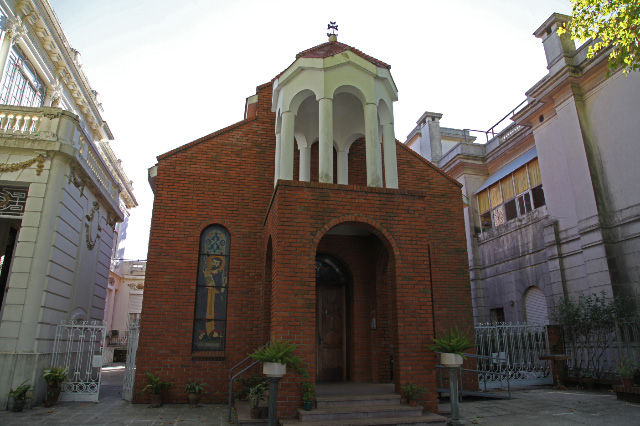 |
|
|
| Catedral Católica Armenia Nuestra Señora de Bzommar en Montevideo en Uruguay – Armenian Catholic Cathedral of Our Lady of Bzommar |
|
|
| |
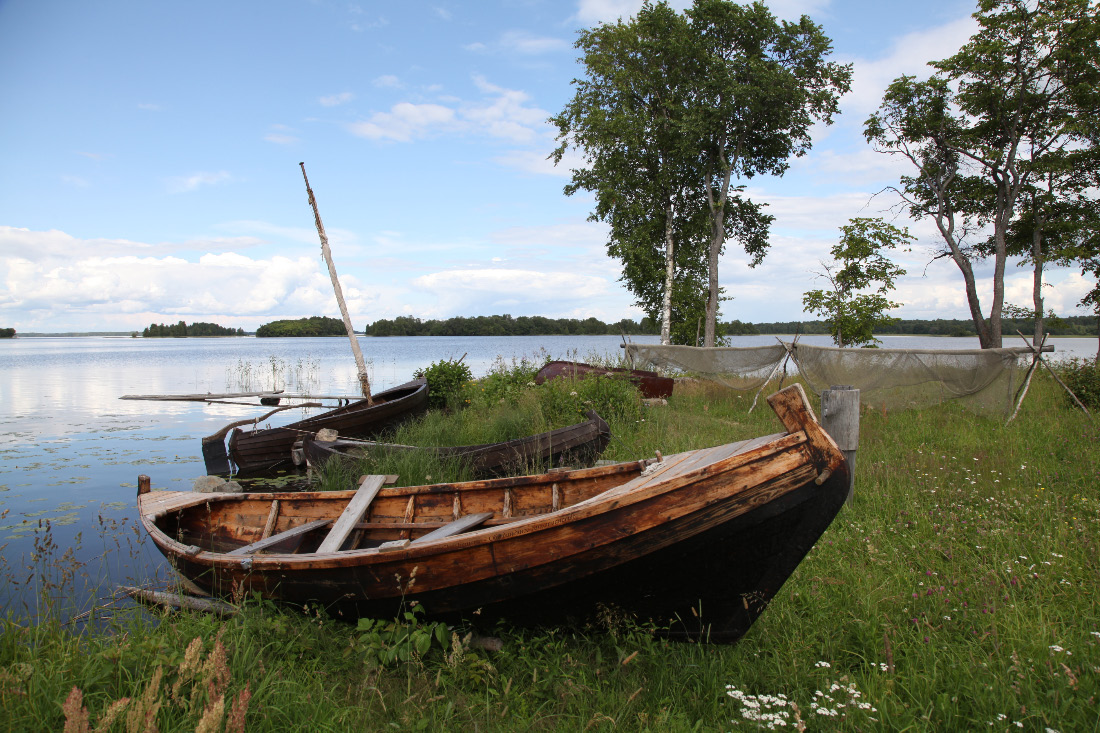 |
|
| |
Fishing boats on Кижи–Kizhi and on Lake Onega – Онежского Озера, the second largest in Europe, with a 9720 km² surface area. The Sea of Galilee has a surface area of about 166 km² at high water.
| On that day, when evening had come, he said to them, Let us go across to the other side. And leaving the crowd, they took him with them, just as he was, in the boat. And other boats were with him. And a great storm of wind arose, and the waves beat into the boat, so that the boat was already filling. But he was in the stern, asleep on the cushion; and they woke him and said to him, “Teacher, do you not care if we perish?” And he awoke and rebuked the wind, and said to the sea, Peace! Be still! And the wind ceased, and there was a great calm. He said to them, Why are you afraid? Have you no faith? And they were filled with awe, and said to one another, “Who then is this, that even wind and sea obey him?” |
| |
Mark 4:35-41 |
|
|
|
|
|
| |
Standing Apostolic Synod
Primacy within the Church throughout the Universe
– a catholic and orthodox understanding –
|
|
| |
If the dialogue among Orthodox, Catholics and Oriental Orthodox is ever to achieve the goal of full Communion and re-unification of the Orthodox-Catholic Church, indeed if it is to progress beyond expressions of good will, personal friendships among mortal and already old or very old men (or friendly acquaintanceship) and atmospherics, the obvious defects of each of these three groups' models for primacy at the universal level within the Church — that such models are either non-canonical or non-workable — must be put aside. More polemical big-O Orthodox criticism of the presumed non-canonical model of the Absolute Monarchy of an Infallible Pope does not move us forward toward the goal of obeying God. Offering up a viable alternative ought to. ...Someone is going to have to step forward and offer a model which can be understood as being both canonical and enduringly workable. This is such an attempt. |
|
| |
Authority within the Church — the Body of Christ, the Icon of the Holy Trinity, the Perpetual Pentacost — the chain of command, love and service: |
|
| The First and Highest Authority within the Church: |
|
God, eternally Father, Son and Holy Spirit |
|
|
|
| The Second Highest Authority within the Church: |
|
An Ecumenical Council lead by the Permenant Protos of the Standing Apostolic Synod, the Bishop and Patriarch of Rome, the Successor to Peter, the Supreme Pontiff, and which must include voting representatives from the three ecclesiastic orders of the episcopacy, the priesthood and the deaconate together with voting representatives drawn from the devout laity, lay persons of outstanding wisdom. An Ecumenical Council is however an event, called and constituted to resolve major doctrinal questions or disputes. An Ecumenical Council is not a standing Church body. Only an Ecumenical Council can clarify or add to, but never change, the Symbol of Faith, the Niceno-Constantinopolitan Creed. |
| |
|
|
| The Third Highest Authority within the Church: |
|
The Holy Standing Apostolic Synod |
| |
One Protos acting within the Three and within the Twelve and within the Seventy.
Three with the One and within the Twelve and within the Seventy
Twelve with the One and with the Three and within the Seventy
Seventy with the One and with the Three and the with Twelve |
|
If numerology to symbolically express and actually achieve holy fullness and fulfillent is unimportant, then why does such numerology figure so very prominently and why was it used so so consistently in the Old and New Testaments? |
|
| |
One, not by rotation, but as a personal office, the Permanent Protos of the Holy Standing Apostolic Synod: the Patriarch and Bishop of Rome, the Successor of Saint Peter, the Supreme Pontiff, His Holiness Pope Benedict XVI now holding this office. |
|
| |
Ubi Petrus, ibi ergo Ecclesia – Where Peter is, there, accordingly, is the Church – Где Peter, там Церковь |
|
| |
|
Sanctus Ambrosius – Sant'Ambrogio – Святой Амвросий Медиоланский – Saint Ambrose
(* c. 339 in Trier 340 – 4 April 397 in Milano †), Doctor of the Church,
baptizer of Saint Augustine of Hippo (*354 – 430†), also Doctor of the Church.
Память святого Амвросия совершается в Православной церкви — 7 декабря
(по старому стилю, то есть 20 декабря новому стилю). |
|
| |
"... [S]ynodality cannot exist without primacy. There has never been and there can never be a synod or a council without a protos. If, therefore, synodality exists jure divino ... primacy must also exist by the same right.
"There seems, in fact, not to exist even in the Orthodox Church, 'a simple primacy of honor.'
" 'Simple honor' seems to suggest no power and authority at all, whereas it is known from experience that the person who chairs a meeting of any kind exercises powers of great significance, including the right to convoke and discuss the meeting, to form the agenda and so on. With regard to the Church, such a description of primacy as "simple honor" seems to contradict basic canonical principles, such as the ones contained in the thirty-fourth Apostolic Canon which states that in every region (presumably a metropolitan district, but by extension in all forms of primacy) there must be a primate (protos) without whom the bishops of the district can do nothing, while he himself can do nothing without them This seems to imply that the primus can even block the deliberations of the synod, if he chooses to do so without the rest of the bishops being able to function synodically in his absence. It is, for example, a well-known canonical provision in the Orthodox Church that in the absence of the patriarch of during the vacancy of his throne there can be no episcopal elections or the performance of any 'canonical acts.' |
|
| |
|
Μητροπολίτης Περγάμου Ιωάννης Ζηζιούλας - Metropolitan John Zizioulas of Pergamon |
|
| |
|
|
|
| |
Orthodoxy as a Confederation of Ethnic Churches or An Ecclesial Body Spread Across the Universe "Such a vision and such a federative realization of the Church will one day lead each Orthodox National Church to fatally develop its own theology at the peril of permanently shattering the two-millennium-old theological and patristic heritage of the Orthodox Church." |
|
| |
|
Archimandrite Prof. Grigorios Papathomas |
|
| |
Three, with the Bishop of Rome the Bishop of Constantinople, His All Holiness Bartholomew I, and the Bishop of Moscow, His Holiness Kirill I |
|
|
|
|
| |
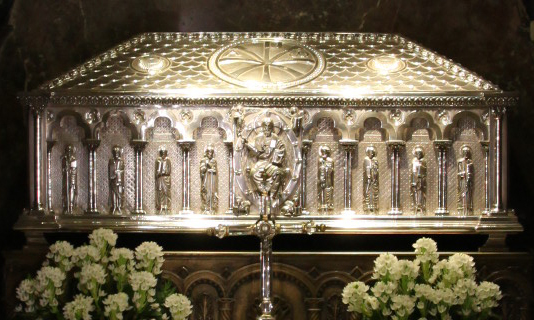 |
|
יַעֲקֹב - Ἰάκωβος - Santiago de Zebedeo/Santiago el Mayor - Иаков Зеведеев - Apostle Saint James the Greater, son of Zebedee, brother of Apostle Evangelist Saint John the Theologian. Reliquary in Santiago de Compostella, Spain.
The brothers —Βοανηργες - Boanerges, Sons of Thunder — were two of The Three Apostles Jesus selected and set apart even with the body of The Twelve Apostles, the other of The Three being Apostle Saint Peter, their leader. |
| |
Twelve, to include the Three and nine others. These nine positions should be allocated with a view to achieving enduring balance and with it legitimacy among the community of the pious Christian faithful. It is to be expected that over the coming centuries and millennia there will be few if any reallocations made with respect to these nine metropolitan Episcopal allocations within the Twelve, as it is anticipated that there can be no changes to the recognition of the Three or certainly none within the just started millennium, as indeed the protos of the Holy Standing Apostolic Synod, any future Ecumenical Council and the Church Universal will never change this side of the Parousia, will always be the Bishop of Rome. With this in mind, the impulse should be resisted to settle on any particular allocation because the current occupant of the office is or is perceived as being particularly holy, intelligent, knowledgable or wise or indeed is perceived as being lacking in any or all of these. Fairness, percieved legitimacy among the community of the Christian faithful and spiritual enrichment all argue in favor of giving due consideration to a metropolitan see's antiquity, the number of the community of the faithful within its flock and balance of representation among liturgical traditions and across global geography. As resolution of those few outstanding theological and ecclesiological disputes is assumed, the Oriental Orthodox must be represented. In view of the foregoing, the following parameters for allocating the remaining nine chairs among the Twelve will not be far off the mark:
The Protos of the Church in Jerusalem (the reasons for including this see are too obvious to elaborate here), His Most Godly Beatitude Patriarch Theophilos III now holding this office;
The Protos of the Church in Alexandria, the Egyptian or Coptic Orthodox Church, His Most Blessed Beatitude Pope Shenouda III now holding this office;
The Protos of the Church in Ethiopia, the Ethiopian Orthodox Tewahedo Church, His Holiness Abune Paulos now holding this office;
In view of the fact that it has the second largest Orthodox community of the faithful after the Russian Orthodox Church, and as Latin and Romanian are the liturgical languages, including the Protos of the Church in Romania, currently His Beatitude Patriarch Daniel, would be a very useful bridge, a reminder that orthodoxy is universal, not exclusively Greek, less so still Slavonic;
Including another Orthodox metropolitan archbishop from Western Europe, North or South America or Australia/Australasia/Oceania would be a very useful gift to remind those Christians who currently see themselves and are seen as Eastern Orthodox and all of us that Orthodoxy is universal / καθολικός (katholikos), not "eastern";
Understanding of the appropriateness and necessity of the foregoing allocation of chairs / kathedra (καθέδρα) among the Twelve senior hierarchs of the Orthodox-Catholic Church -- The Church -- means that there are only four remaining chairs which could be allocated among those bishops currently within the Catholic Church structure and tradition., even though the number of people presently within the Catholic community of the faithful might argue for a higher number. Without forgetting the criteria other than size of the flock, as set forth above, this deficiency, if it is one, is fully offset by the fact that the Bishop of Rome is the Protos of the Universal Church as also by the circumstance that corresponding adjustments can be made as an understanding emerges as to the appropriate membership of the other fifty-eight bishops among the Seventy.
Considering the foregoing and the goals of the Church, it would be useful for at least one and possibly two of these senior metropolitan Episcopal seats to be understood as properly residing in a local Church which is by tradition lead by a non-Latin-rite Catholic bishop, that is by the protos of one of those autonomous, self-governing, sui iuris Churches which has already by long tradition been in full Communion with the Bishop of Rome: The Byzantine/Greek Catholic Churches (the Arabic-speaking Greek-Catholic Melkites or the Ukrainian, Old Church Slavonic Greek-Catholics from the Ukraine) or one of those Oriental Catholic Churches following the Coptic, Antiochian or Syriac, Armenian or Chaldean liturgical traditions.
As the largest of these, there would be an obvious appeal in choosing the Protos of the Ukrainian Greek Catholic Church, with the recent retirement of Cardinal Lubomyr Husar, currently headed by His Beatitude Archbishop Sviatoslav Shevchuk. Mutual recriminations in recent decades, and centuries of hostility, mistrust and even violence would make such a choice at present extraordinarily unpopular within the Moscow Patriarchate, a deal stopper. When considering this matter, the bishops of the world, and certainly including those within the Russian Orthodox Church, will be invited to recall that much will change for the better if those same bishops can unite on an understanding of Primacy at the Universal Level. Once united, and understanding the need for and urgency of a return to the ecclesiological norm of One Bishop in One Territory, many of the problems of the past will cease to exist. Indeed as all of the Orthodox-Catholic bishops of the world will be in full Communion with the Bishop of Rome as with the Bishop of Constantinople and the Bishop of Moscow, there is no obvious reason why the name Ukrainian Greek Catholic Church would continue to be used. The Russians can hardly object to there also being one or more bishops from the Ukraine numbered within the Standing Apostolic Synod, including perhaps one among the Twelve.
Although compelling arguments do not emerge from recalling the long-outdated Byzantine Imperial notion of the Pentarchy, as an alternative to the bishop currently Protos of the UGCC, there are strong and obvious arguments for numbering among the Twelve at least one bishop who uses liturgically the language spoken by our Lord and His Apostles among themselves, Aramaic. The Protos of the Syriac Catholic Church, currently Mar Ignatius Joseph III Younan, the Protos of the Maronite Syriac Church of Antioch, currently His Beatitude Patriarch Mar Bechara Boutros al-Rahi and the Protos of the Syriac Orthodox Church, His Holiness Ignatius Zakka I Iwas, the first two of whom are currently in Communion with Rome but not Constantinople or Alexandria, the third of whom is in Communion with Alexandria but not Rome or Constantinople and all three of whom claim to be the rightful successor to the Patriarchs of Antioch, could choose one of their number or a fourth bishop to fill this seat among the Twelve, and in so doing also remove the scandal and schism of having two bishops in one territory. This bishop, apart from his duties on the Standing Apostolic Synod, could with the assistants of auxiliary bishops and vicars also act as the spiritual father to the Byzantine-liturgical-rite Greek Orthodox Church of Antioch (in Communion with Constantinople, but not with Rome or Alexandria) and the Byzantine liturgical-rite, vernacular-language Melkite Greek Catholic Church (in Communion with Rome but not with Constantinople or Alexandria). (Note that the Patriarchs of these two join the previous mentioned three in regarding themselves as the rightful successors to the Patriachial throne of the Church of Antioch, founded by Saint Peter. ) Or these five "Patriarchs of Antioch" can face God and explain to Him how His calls for Christian unity were outweighed by other considerations.
The remaining two or three bishops to be numbered among the Twelve should be chosen from among Latin-rite Catholics with a view toward balancing geographic diversity among Western Europe, Eastern Asia and North and South America, among these continents giving consideration to which lands were not represented by the Orthodox bishop last referred to before the discussion of Catholic representation.
|
|
| |
Seventy, to include the Twelve plus fifty-eight other senior metropolitan bishops, should somehow embody "acceptance", as acceptance by the community of the Christian Faithful is also embodied in the Ecumenical Council with participation of devout laity. As with allocation of chairs within the Twelve, so too with these other fifty-eight within the Seventy, due consideration should be given to a metropolitan see's antiquity, the number of the community of the faithful within its flock and balance of representation among liturgical traditions and across global geography |
|
| |
Decisions of the Standing Apostolic Synod, whether by the full Seventy or by the Twelve, will be by Fraternal Unanimity, a term of art which the Standing Apostolic Synod will corporately work out. A great deal of consideration will also need to be given by this self-same body as to what types of matters need to be referred to the Seventy and what types of matters can be resolved by the Twelve or even by the Three. Obviously actual unanimity can not be meant. No one forgets the ordeal of the Polish-Lithuanian Commonwealth and their Liberum Veto folly. And yet is it possible to dare to suggest that Fraternal Unanimity must needs mean affirmation of any decision by a 2/3 or 3/4 vote, not simple majority — after considerable open deliberation and a concerted effort in fraternal love to obtain the support of actual unanimity — and such decisions must include the concurrence of all of the Three. No decision can be reached without the concurrence of the Pope. And no decision can be reached by the Pope in isolation from the rest of the body of the Standing Apostolic Synod. |
|
| |
And dare we hope that an ecclesiology along the lines of that herein suggested would, by the Grace of God, keep things like Nostra Aetate, and the evil that flows from them, from happening ever again? And more broadly and deeply and enduringly, that the Ancient Churches, orthodox and catholic, can be relied on by the holy Community of the Faithful, separated out of the world unto God, to supply each other's deficiencies. |
|
|
| |
Chapter Fifteen of the Acts of the Apostles
and the
Apostolic Council of Jerusalem
the
Great Proto-Ecumenical Council |
|
| |
|
|
|
|
| |
The Great Break: Christianity is not a Jewish Sect |
|
| |
|
|
|
|
| |
|
But some men came down from Judea and were teaching the brethren, “Unless you are circumcised according to the custom of Moses, you cannot be saved.” And when Paul and Barnabas had no small dissension and debate with them, Paul and Barnabas and some of the others were appointed to go up to Jerusalem to the apostles and the elders about this question. So, being sent on their way by the church, they passed through both Phoenicia and Samaria, reporting the conversion of the Gentiles, and they gave great joy to all the brethren. When they came to Jerusalem, they were welcomed by the church and the apostles and the elders, and they declared all that God had done with them. But some believers who belonged to the party of the Pharisees rose up, and said, “It is necessary to circumcise them, and to charge them to keep the law of Moses.” |
|
| |
|
|
|
|
|
|
The apostles and the elders were gathered together to consider this matter. |
|
| |
|
|
|
|
|
|
And after there had been much debate, Peter rose and said to them, “Brethren, you know that in the early days God made choice among you, that by my mouth the Gentiles should hear the word of the gospel and believe. And God who knows the heart bore witness to them, giving them the Holy Spirit just as he did to us; and he made no distinction between us and them, but cleansed their hearts by faith. Now therefore why do you make trial of God by putting a yoke upon the neck of the disciples which neither our fathers nor we have been able to bear? But we believe that we shall be saved through the grace of the Lord Jesus, just as they will.” |
|
| |
|
|
|
|
|
|
And all the assembly kept silence; |
|
| |
|
|
and they listened to Barnabas and Paul as they related what signs and wonders God had done through them among the Gentiles. |
|
| |
|
|
|
|
|
|
After they finished speaking, James replied, “Brethren, listen to me. Symeon has related how God first visited the Gentiles, to take out of them a people for his name. And with this the words of the prophets agree, as it is written, |
|
| |
|
|
|
| |
|
|
‘After this I will return,
and I will rebuild the dwelling of David, which has fallen;
I will rebuild its ruins,
and I will set it up,
that the rest of men may seek the Lord,
and all the Gentiles who are called by my name,
says the Lord, who has made these things known from of old.’ |
|
| |
|
|
|
|
|
|
Therefore my judgment is that we should not trouble those of the Gentiles who turn to God, but should write to them to abstain from the pollutions of idols and from unchastity and from what is strangled and from blood. For from early generations Moses has had in every city those who preach him, for he is read every sabbath in the synagogues.” |
|
| |
|
|
|
|
| |
|
Then it seemed good to the apostles and the elders, with the whole church, to choose men from among them and send them to Antioch with Paul and Barnabas. They sent Judas called Barsabbas, and Silas, leading men among the brethren, with the following letter: |
|
| |
|
|
|
|
| |
|
|
“The brethren, both the apostles and the elders, to the brethren who are of the Gentiles in Antioch and Syria and Cilicia, greeting. Since we have heard that some persons from us have troubled you with words, unsettling your minds, although we gave them no instructions, it has seemed good to us in assembly to choose men and send them to you with our beloved Barnabas and Paul, men who have risked their lives for the sake of our Lord Jesus Christ. We have therefore sent Judas and Silas, who themselves will tell you the same things by word of mouth. |
|
| |
|
|
|
|
|
|
|
|
For it has seemed good to the Holy Spirit and to us to lay upon you no greater burden than these necessary things: |
|
| |
|
|
|
|
| |
|
|
that you abstain from what has been sacrificed to idols and from blood and from what is strangled and from unchastity. If you keep yourselves from these, you will do well. Farewell.” |
|
| |
|
|
|
|
| |
|
So when they were sent off, they went down to Antioch; and having gathered the congregation together, they delivered the letter. And when they read it, they rejoiced at the exhortation. And Judas and Silas, who were themselves prophets, exhorted the brethren with many words and strengthened them. And after they had spent some time, they were sent off in peace by the brethren to those who had sent them. But Paul and Barnabas remained in Antioch, teaching and preaching the word of the Lord, with many others also. |
|
| |
|
|
|
|
|
|
And after some days Paul said to Barnabas, “Come, let us return and visit the brethren in every city where we proclaimed the word of the Lord, and see how they are.” And Barnabas wanted to take with them John called Mark. But Paul thought best not to take with them one who had withdrawn from them in Pamphylia, and had not gone with them to the work. And there arose a sharp contention, so that they separated from each other; Barnabas took Mark with him and sailed away to Cyprus, but Paul chose Silas and departed, being commended by the brethren to the grace of the Lord. And he went through Syria and Cilicia, strengthening the churches. |
|
| |
|
|
|
|
|
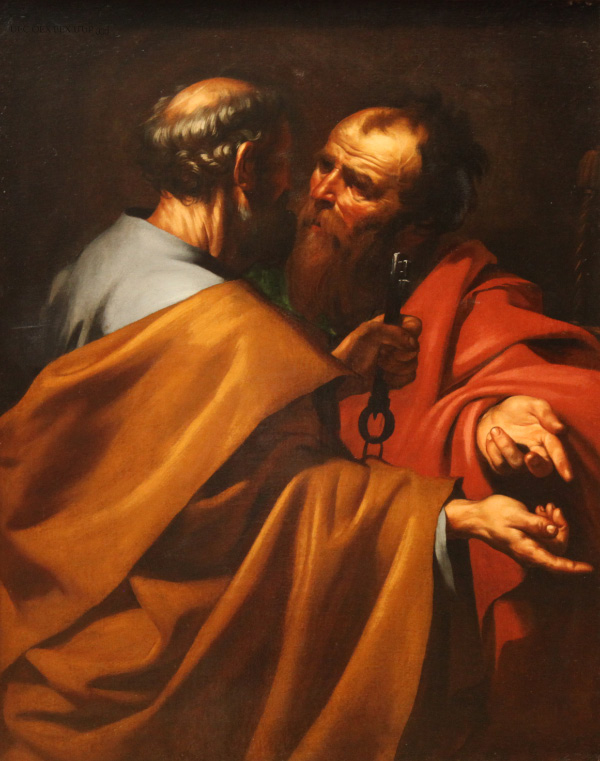 |
|
|
Saints Peter and Paul, c. 1612 by Jusepe de Ribera – José de Ribera y Cucó
(* Xátiva, España, 12 de enero de 1591 – Napoli, Italia 2 settembre 1652 †) |
|
|
| |
11 But when Cephas came to Antioch I opposed him to his face, because he stood condemned [in other translations: "because he clearly was wrong"]. 12 For before certain men came from James, he ate with the Gentiles; but when they came he drew back and separated himself, fearing the circumcision party. 13 And with him the rest of the Jews acted insincerely, so that even Barnabas was carried away by their insincerity. 14 But when I saw that they were not straightforward about the truth of the gospel, I said to Cephas before them all, “If you, though a Jew, live like a Gentile and not like a Jew, how can you compel the Gentiles to live like Jews?” 15 We ourselves, who are Jews by birth and not Gentile sinners, 16 yet who know that a man is not justified by works of the law but through faith in Jesus Christ, even we have believed in Christ Jesus, in order to be justified by faith in Christ, and not by works of the law, because by works of the law shall no one be justified. |
|
| |
|
Galatians 2:11-16 |
|
| |
|
|
|
| |
Then an argument broke out among them about which of them should be regarded as the greatest. He said to them, "The kings of the Gentiles lord it over them and those in authority over them are addressed as 'Benefactors'; but among you it shall not be so. Rather, let the greatest among you be as the youngest, and the leader as the servant." |
|
| |
|
Luke 22:24-26 |
|
| |
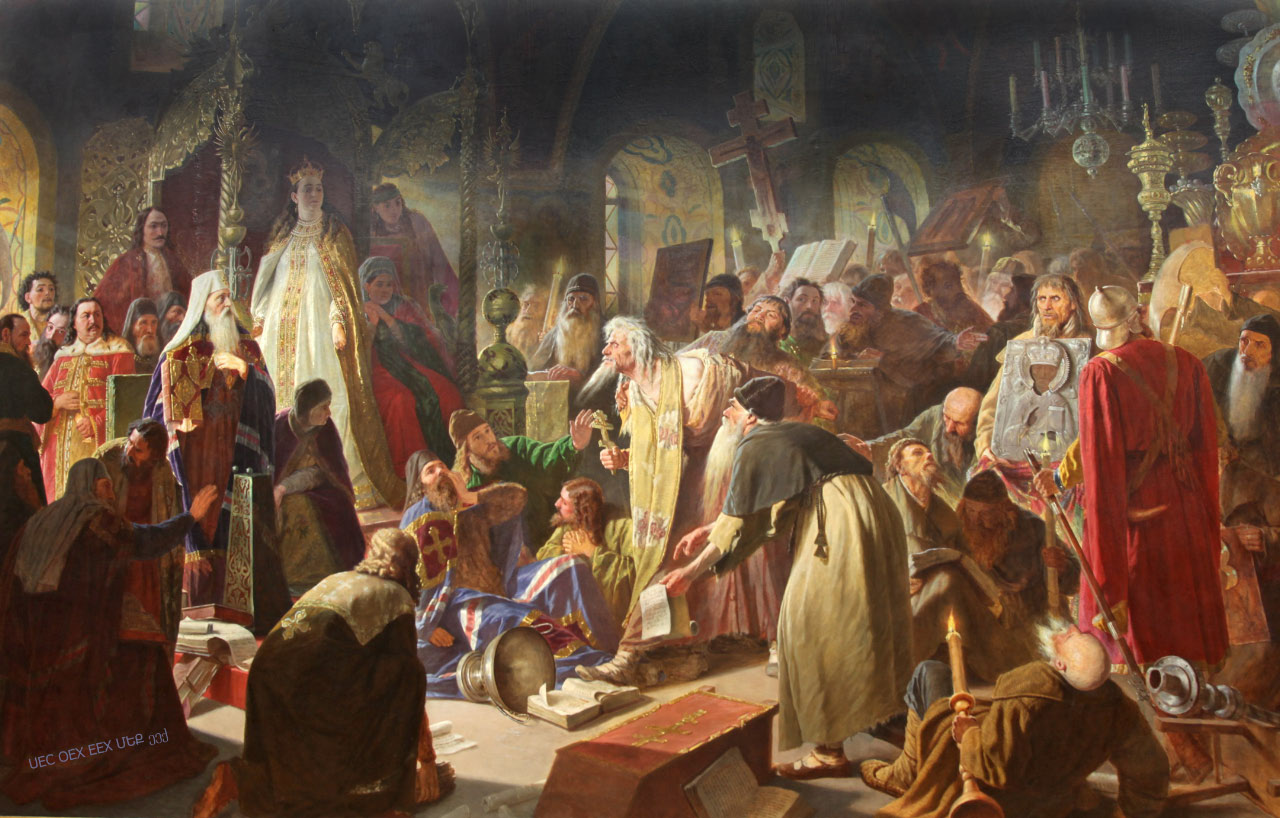 |
| |
|
... well, maybe we can do better than this. Спор о Вере - Dispute About Faith, 1880-1881 work by Vasily Grigorevich Perov - Василий Григорьевич Перов |
| |
|
|
| |
|
When you are invited by someone to a wedding banquet, do not recline at table in the place of honor. A more distinguished guest than you may have been invited by him, and the host who invited both of you may approach you and say, 'Give your place to this man,' and then you would proceed with embarrassment to take the lowest place. Rather, when you are invited, go and take the lowest place so that when the host comes to you he may say, 'My friend, move up to a higher position.' Then you will enjoy the esteem of your companions at the table. For everyone who exalts himself will be humbled, but the one who humbles himself will be exalted.
Luke 14:8-11 |
| |
|
|
|
|
|
|
|
|
The Church Militant |
|
|
|
| |
|
|
|
|
| |
The Church Suffering |
|
|
|
| |
|
|
|
|
| |
The Church Triumphant |
|
|
|
| |
|
|
|
|
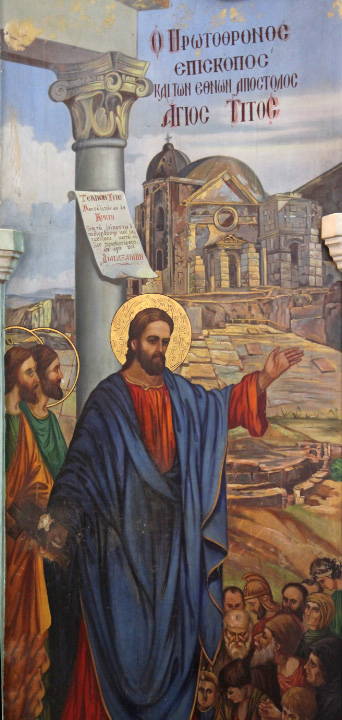 |
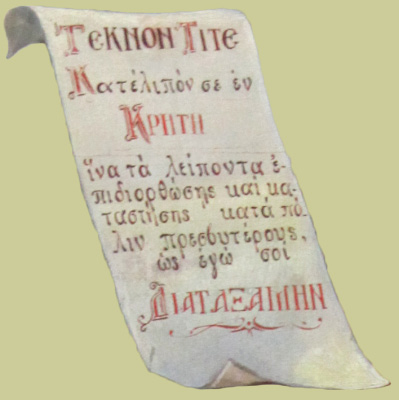 |
|
| |
|
... icons in Church of Saint Titus in Heraklion, Crete, Greece |
| |
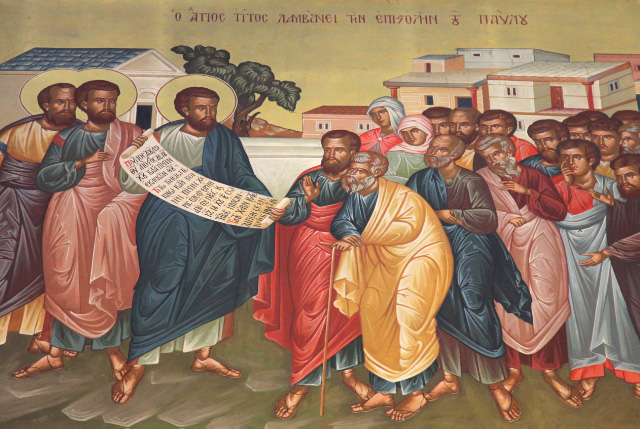 |
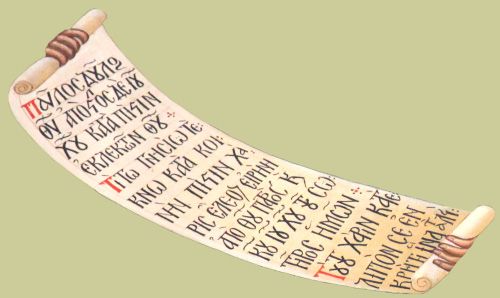 |
| |
|
|
| |
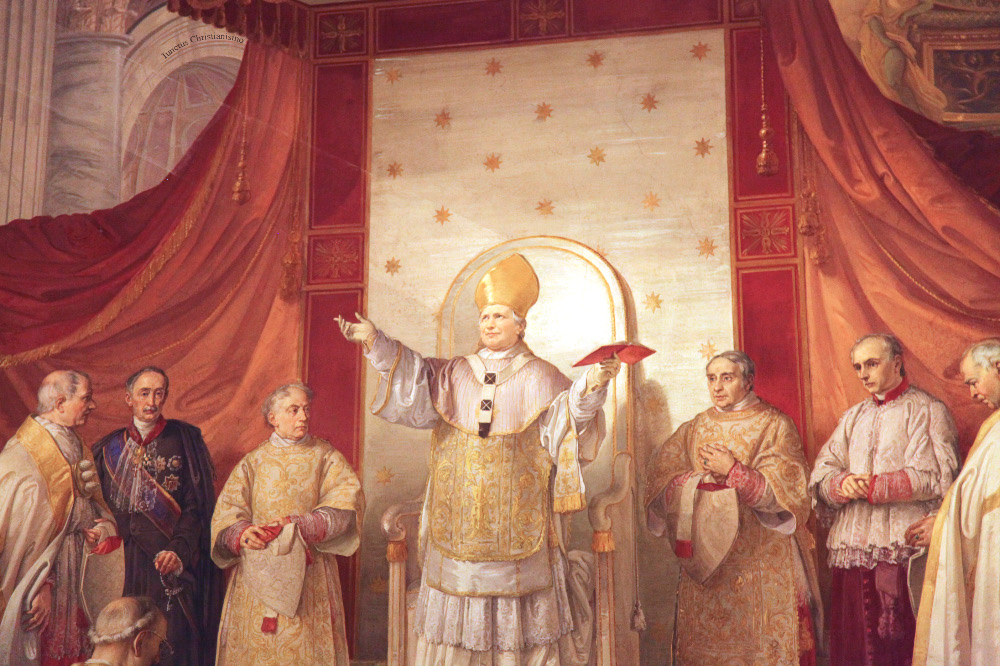 |
|
| |
With the heaviest of hearts all Orthodox-Catholic Christians must recognize that here one finds one of the central-most question dividing the three families of Ecclesiastic communities which constitute the Church, keeping the Catholic, Orthodox and Oriental Orthodox Churches from actually being the Orthodox-Catholic Church, one, holy and apostolic, as they should be. The smartest, holiest, highest Oriental Orthodox and Orthodox are willing to accept the Bishop of Rome as the Successor of Peter in a unique sense, the Prince of the Successors to the Apostles, the first heirarch of the Universal Church, the only Church, The Church. He can and should announce to the world — as did Peter at the Council of Jerusalem as recorded in the Fifteenth Chapter of the Acts of the Apostles — the decisions of the Holy Spirit and of the Successors to the Apostles. He just can not make these decisions by himself.
Piictured is a detail from Promulgation of the Dogma of the Immaculate Conception by Francesco Podesti in the Vatican Room of the Immaculate Conception.
Without daring to insinuate that Pope Pius IX was wrong on the substantive point of doctrine, or even that he could have been wrong, should Pope Pius IX's teaching on the Immaculate Conception of the Blessed Virgin Mary have been left to the realm of pious theological opinion – theologumena, matters to be used by the believer if useful and set aside if not, so long as they do not contradict orthodox teaching?
Accepting a holy place for pious theological opinion – theologumena within orthodox Christianity and so within the Orthodox-Catholic Church is not an embrace of Latitudinarianism, a blurring of doctrinal boundaries.
"[A]ll who are truly Christ's believe, for example, the Conception of the Mother of God without stain of original sin with the same faith as they believe the mystery of the August Trinity, and the Incarnation of our Lord just as they do the infallible teaching authority of the Roman Pontiff, according to the sense in which it was defined by the Ecumenical Council of the Vatican. Are these truths not equally certain, or not equally to be believed, because the Church has solemnly sanctioned and defined them, some in one age and some in another, even in those times immediately before our own?"
|
|
| |
|
Pope Pius XI ( r. 6 February 1922 to 10 February 1939 †) in Mortalium Animos, Encyclical on Religious Unity, 1928 |
|
|
|
|
|
|
|
| |
Irenicism |
ειρήνη |
eirene |
peace |
|
| |
ἐιρηνικόν |
eirenikon |
irenicum |
peace proposal |
|
| |
How do we differentiate Irenicism from False Irenicism?
We do not. The Popes and the Patriarchs and Metropolitan Archbishops of the Orthodox-Catholic Church do, with Acceptance by the Community of the Orthodox-Christian Faithful and with non-orthodox not invited to the table until after they have united with the Orthodox-Catholic Church. |
|
"If people are scandalized at the truth, it is better to allow the birth of scandal, than to abandon the truth." |
|
And as revolting as it it to all faithful Orthodox-Catholic Christians, as the Standing Apostolic Synod model develops — God willing and by His Grace — other critical issues will have to be dealt with in parallel, crises that an ailing Church Militant is throwing at all of us. Of course these simply do not exist in the Church Suffering or the Church Triumphant, but for us here and now, they are real enough. One such issue, and many thoughtful people have concluded that it is the first and most glaring, or eclipsing, of all such critical problems, is homosexuality. Is it inappropriate to mention this on this page? It is not optimal. In Truth, not only must bishops protecting and celebrating homosexuality be utterly excluded from participating in an Ecumenical Council or from being members of the Standing Apostolic Synod — the One, the Three, the Twelve or the Seventy — the absolute bar must extend to any bishop with any same sex attraction. How achieve this lofty imperative? Well, God could do it, for example by converting and transforming the wayward bishops into holy men, into fundamentally different people from whom they are now. Or He could clear them out of the ranks of the priesthood, episcopacy, cardinalate and the monastic orders by striking them dead. If God in His inscrutable design want us to deal with the pernicious problem, then how? The One of the Standing Apostolic Synod certainly did not do it, and indeed things went from bad to much, much worse during the pontificate of the now canonized John Paul II. Benedict's efforts were too little, too late. He failed. As for Francis, of course we can pray for a miracle. In truth though, the laity are going to have to sweep this filth from the Church. Until they do, the Standing Apostolic Synod will not work, but of course so too will not work the monarchical papal model which got us into this mess. |
| |
Pope Saint Gregory I, the Great (* c. 540 to 12 March 604†), Hom. Super Ezech. vii
|
| |
|
|
| And what is the authority to support this model of primacy in the Orthodox-Catholic Church Universal? |
|
| |
Authority from the Biblical New Testament Canon
(New Testament times through circa 100/102 Anno Domini -- the New Testament and the Letter of Saint Clement to the Christians in Corinth)
|
| |
Authority from the writings by and about the Ante-Nicene Fathers
(From 100 AD to 325 AD, i.e., from the end of New Testament times to the Council of Nicea, the First Ecumenical Council)
|
| |
Authority from the writings of the Nicene and Post-Nicene Fathers
(From 325 AD circa 787 AD, i.e., from the time of the First Council of Nicea, the First Ecumenical Council, to the time of the Second Council of Nicea, the Seventh Ecumenical Council) |
| |
|
| |
|
| |
|
| "Rise, and have no fear." |
|
"This is my beloved Son, with whom I am well pleased; listen to him." |
the Holy Spirit |
Man proposes, God disposes |
|